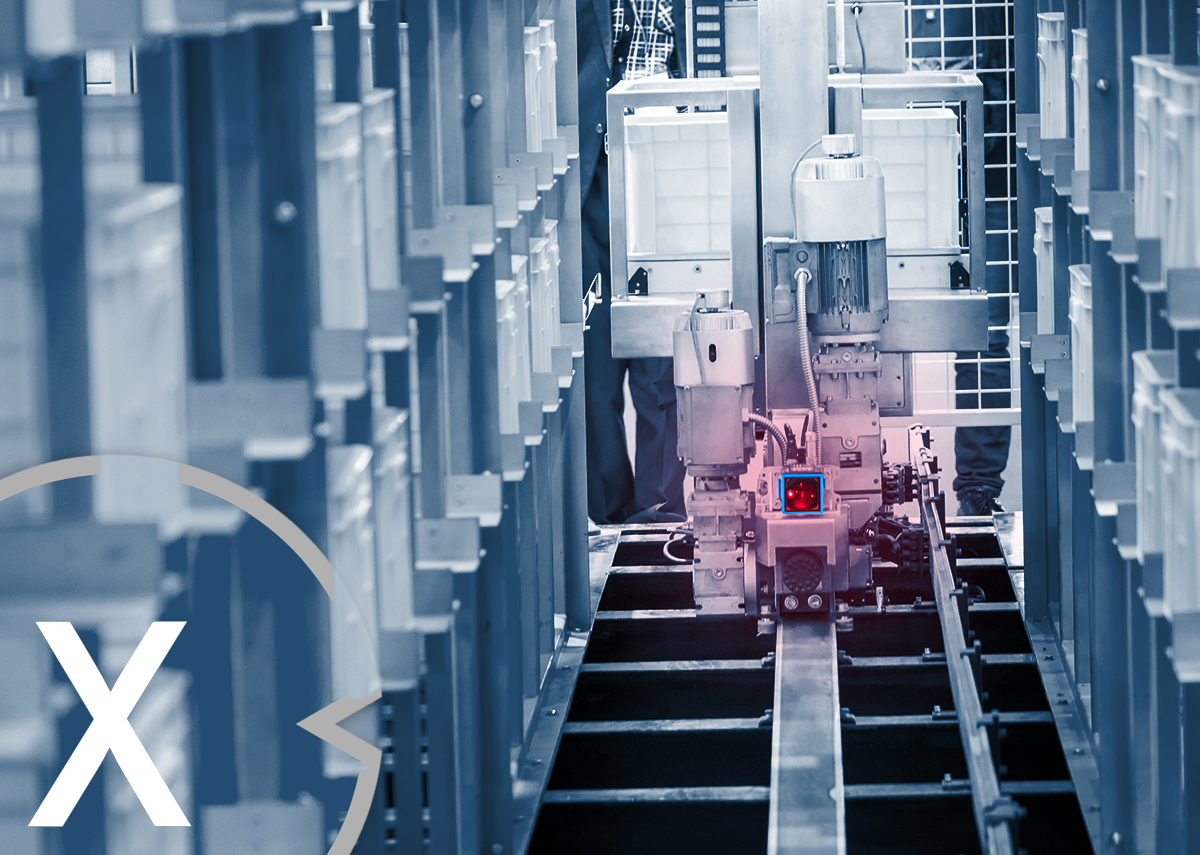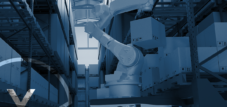
Industrial Sensors & Autonomous Mobile Robot (AMR) – Image: Xpert.Digital / zhu difeng|Shutterstock.com
Smart & Intelligent Industrial Sensors: Industrial Sensors & Autonomous Mobile Robot (AMR)
Smart and intelligent industrial sensors and autonomous mobile robots (AMR) are revolutionizing various industries by improving automation, efficiency and safety.
Smart and Intelligent Industrial Sensors
Industrial sensors are devices that detect and measure physical or chemical properties in industrial environments. Smart and intelligent sensors are equipped with advanced features such as connectivity, data processing and decision algorithms. They can provide real-time data, perform analysis, and communicate with other devices or systems.
Here are some examples of smart industrial sensors:
Temperature sensors
They monitor and control temperature fluctuations in industrial processes to ensure optimal conditions and prevent damage to equipment.
Pressure sensors
They measure the pressure in machines, pipelines or systems to ensure safe operating conditions and detect anomalies.
Proximity sensors
Detect the presence or absence of objects in a defined area and enable automation in various industrial applications.
Accelerometers
Measure acceleration, vibration and tilt in machines or structures to detect possible errors or optimize performance.
Gas sensors
Detect and monitor the presence of hazardous gases to ensure employee safety and prevent accidents.
➡️ These smart sensors collect and analyze data, enabling predictive maintenance, process optimization and improved overall efficiency in industries such as manufacturing, energy, healthcare and logistics.
Autonomous Mobile Robots (AMRs)
AMRs are robotic systems that can navigate and perform tasks in industrial or commercial environments without human intervention. They are equipped with sensors, cameras and advanced algorithms to perceive their surroundings, plan routes and carry out tasks independently.
AMR offer numerous benefits including:
Material transport (material handling)
AMRs can transport goods, materials or products in warehouses, factories or distribution centers. They optimize logistical processes by reducing manual work and increasing efficiency.
Inventory management
AMRs can independently scan and track inventory, update databases, and locate items in large warehouses. This streamlines inventory management processes and reduces errors.
Inspection and maintenance
AMRs equipped with sensors and cameras can perform inspections, monitor equipment, and detect anomalies or errors. They can be used in industries such as oil and gas, utilities and manufacturing.
Collaborative robots
Some AMRs are designed to work alongside human workers, assisting them with tasks that require heavy lifting, repetitive tasks, or precise movements. They increase employee productivity and safety.
AMRs can adapt to changing environments, avoid obstacles and optimize their routes based on real-time data. They are a key component of the growing field of Industry 4.0, transforming industries such as e-commerce, logistics, manufacturing and healthcare.
➡️ Smart and intelligent industrial sensors along with autonomous mobile robots will further drive automation and efficiency in various industries. They enable real-time data collection, analysis and decision making, resulting in higher productivity, cost savings and improved worker safety.
Xpert.Plus warehouse optimization - high-bay warehouses such as pallet warehouses consulting and planning
Smart & Intelligent Industrial Sensors: Industrial Sensors - Intelligent Image Processing and Intelligent Logistics Equipment
Smart industrial sensors play a crucial role in modern industrial applications. They enable the collection, measurement and monitoring of various parameters in real time to optimize operations, increase efficiency and improve safety. Two important types of intelligent industrial sensors are intelligent image processing and intelligent logistics equipment.
Intelligent image processing sensors
Intelligent vision sensors use advanced image processing algorithms and artificial intelligence to analyze and interpret visual information. They can be used in quality control to detect defects in products or in monitoring production processes to detect anomalies or deviations. By analyzing images, intelligent vision sensors can detect defects faster than human inspectors, increasing productivity and reducing costs.
Smart logistics equipment sensors
Intelligent logistics equipment sensors enable efficient and automated control of logistical processes. For example, they can be used in automated warehouses to monitor inventory, track the location of goods and optimize material flow. Smart logistics equipment sensors can also be deployed in vehicles to monitor vehicle health, optimize route planning, and provide real-time data for fleet management.
➡️ These smart industrial sensors are often based on various technologies such as optical sensors, infrared sensors, ultrasonic sensors, RFID (Radio-Frequency Identification) and wireless communication protocols. They collect data from the environment, process it and provide important information for decision-making processes in real time.
The advantages of intelligent industrial sensors are diverse. They enable improved quality assurance, faster error detection, a reduction in scrap and downtime, and increased efficiency in production and logistics processes. In addition, they can improve workplace safety by identifying potentially dangerous situations and providing timely warnings.
Intelligent industrial sensors help drive automation and digitalization in industry and increase the competitiveness of companies. By integrating artificial intelligence and advanced sensor capabilities, production and logistics processes are optimized, resulting in increased efficiency, flexibility and profitability.
The future of industrial sensors and IoT (Internet of Things)
The future of industrial sensors in the context of the Internet of Things (IoT) looks promising. Industrial sensors play a critical role in collecting data in industrial environments, enabling companies to gain valuable insights, optimize operations and make more efficient decisions.
Below are some industrial sensor trends and developments related to IoT:
Miniaturization and cost reduction
The miniaturization of sensors enables their integration into smaller devices and systems. At the same time, the cost of sensors is falling, allowing their wider use in various industries.
Wireless connectivity
Industrial sensors are increasingly being connected wirelessly to IoT platforms. This allows data to be collected and monitored in real time, allowing for greater responsiveness and faster troubleshooting.
Energy efficiency
Sensors are becoming more energy efficient, allowing for longer battery life. This is particularly important for IoT applications where sensors need to work autonomously for an extended period of time.
Edge computing
By using edge computing, sensor data can be processed and analyzed on-site instead of sending it to a central cloud infrastructure. This enables real-time analysis and faster response to events.
Artificial intelligence and machine learning
Integrating AI and ML algorithms into industrial sensors enables advanced analytics and predictions. Sensors can be self-learning and detect anomalies or discrepancies in the data to identify potential problems early.
Data integration and data analysis
By integrating industrial sensors into broader IoT platforms, companies can collect, integrate, and analyze data from multiple sources. This enables them to gain comprehensive insights and improve their operational efficiency.
Security
The security of industrial sensors and the associated IoT infrastructures is becoming increasingly important. Companies must take measures to protect sensor data from unauthorized access and manipulation.
➡️ Industrial sensors in the IoT context will continue to gain in importance and play a central role in the digital transformation of industrial companies. By collecting and analyzing data in real-time, companies can optimize their processes, reduce costs, improve product quality and create new business opportunities.
Logistics consultant: Use our Xpert.Plus service for your logistics consulting, warehouse planning or warehouse consulting with industrial sensors and intelligent image processing
Xpert.Plus is a project from Xpert.Digital. We have many years of experience in supporting and advising on storage solutions and in logistics optimization, which we bundle in a large network Xpert.Plus
I would be happy to serve as your personal advisor.
You can contact me by filling out the contact form below or simply call me on +49 89 89 674 804 (Munich) .
I'm looking forward to our joint project.
Xpert.Digital – Konrad Wolfenstein
Xpert.Digital is a hub for industry with a focus on digitalization, mechanical engineering, logistics/intralogistics and photovoltaics.
With our 360° business development solution, we support well-known companies from new business to after sales.
Market intelligence, smarketing, marketing automation, content development, PR, mail campaigns, personalized social media and lead nurturing are part of our digital tools.
You can find out more at: www.xpert.digital – www.xpert.solar – www.xpert.plus

